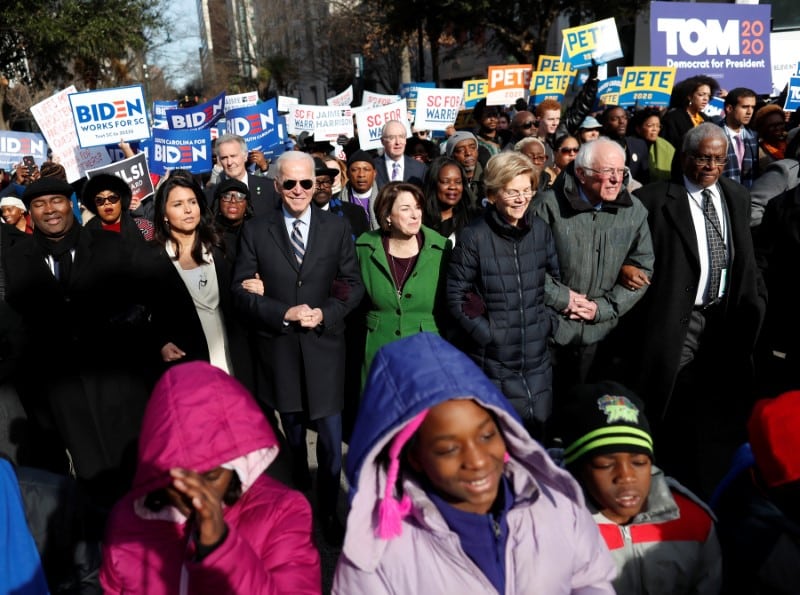Senators Bernie Sanders and Elizabeth Warren marched arm-in-arm on Monday, as a group of often feuding U.S. presidential candidates set aside their differences long enough to celebrate Martin Luther King Jr.
Other Democratic White House hopefuls, including Pete Buttigieg, shook up multi-state campaign schedules to seek the support of black voters in Columbia, South Carolina, who will be crucial to victory in a tight race for their party’s nomination.
“Our job is not just to remember the history of Dr. King, it is to absorb his revolutionary spirit and apply it today,” Sanders said at a rally after the march.
Monday is the federal holiday celebrating King, who was shot dead by an assassin in 1968 at age 39. King’s efforts are credited with the expansion of black civil rights sometimes seen as under attack today.
Monday’s rally was organized under the theme “we vote, we count” by local chapters of the NAACP.
Candidates have packed their holiday schedules in the crucial final days before Iowa holds its Feb. 3 caucus, the nation’s first nominating contest. After the rally, several of the candidates rushed to catch flights to a forum on policy issues facing black voters in Des Moines, Iowa.
The day’s events marked a rare moment of apparent harmony between candidates, including Sanders, Warren and Joe Biden, who have clashed in recent days.
Warren and Sanders have sparred over differing accounts of a 2018 private meeting between them, while Sanders and Biden have sparred over their views on Social Security, the retirement and disability benefits program popular with voters.
But all are united in seeking support of black voters, who will play a key role as Democrats choose who will face President Donald Trump in the November 2020 election. They account for more than one in five Democratic primary voters nationally and about two-thirds of the party electorate in South Carolina, making the state a scene of frequent campaign stops.
South Carolina Democrats hold the fourth nominating contest on Feb. 29, before the 14 states holding contests on Super Tuesday on March 3.
“They spend a lot of time here,” said JT McLawhorn, president of the Columbia Urban League, a South Carolina nonprofit organization that hosted the candidates at a breakfast on Monday. “You seem them so much you think they live here.”
Biden leads among black voters nationally, with about 24% of the vote, compared to Sanders at 16%, according to an average of recent Reuters/Ipsos polls. A quarter of black voters said they were undecided.
Democrats have crafted competing policies on voter suppression, economic development and criminal justice reform aimed at courting black voters.
Michael Bloomberg, for instance, this week unveiled a pledge to spend $70 billion to fight poverty in 100 disadvantaged neighborhoods if elected, and announced efforts to help one million black Americans become homeowners over 10 years. He marched in a parade not far from the Little Rock, Arkansas, school desegregated with the backing of federal troops in 1957.
(Reporting by Trevor Hunnicutt; Editing by Nick Zieminski and Bill Berkrot)

























 Continue with Google
Continue with Google